The �������� recently held its 3rd annual ‘Future of Music’ industry conference. As part of the event, we invited along start-ups to demo their products and music experiences to the attendees. Cyrus Saihan is Head of Digital Partnerships and explains more about how technology is continuing to transform the music industry.
If someone had told you 10 years ago that they could have a conversation with their hi-fi speaker, be virtually teleported to a music festival from their living room and carry millions of songs with them wherever they went, it is unlikely that you would have believed them.
Today, experiencing music in such ways is increasingly commonplace. Advances in technology have brought about dramatic changes to the way that we listen to, buy and interact with music and radio. Driven by the rapid growth of devices such as smartphones and tablets, new digital music services and formats have emerged, with innovation taking place across the music and radio industry.
Future of Music Conference 2016
On Friday 4th November we held a half-day ‘Future of Music’ conference, bringing together industry experts from across the sector to discuss and debate how digital music and innovation is likely to impact the music and radio industry in the coming years.
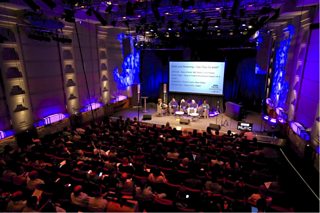
A panel discussion at our Future of Music 2016 conference
From Guglielmo Marconi transmitting the first radio waves across the earth (from the Isle of Wight to Cornwall) to the music of some of the world’s biggest selling acts such as the Beatles and Adele, the UK has always been a major influencer and innovator when it comes to music.
It is exciting to consider what could come next from the UK’s music industry.
With that in mind, as part of our Future of Music conference, we invited along some interesting start-ups to demo their products and services to the attendees. We had a variety of start-ups at the event, ranging from one that uses artificial intelligence to write new songs, to one that has created a ‘3D’ music controller that allows you to manipulate sounds just by moving your hand around in thin air.
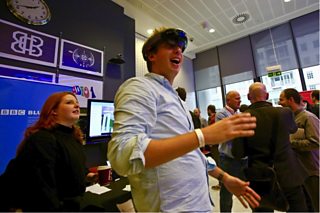
An attendee trying out a ‘mixed reality’ experience
Artificial intelligence and music
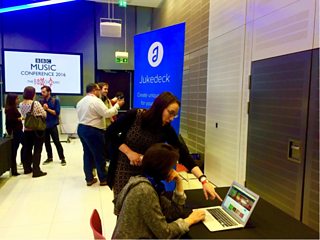
Jukedeck demoing their artificial intelligence music creator
Set up in 2014 by two Cambridge University graduates, is training ‘neural networks’ (computer systems modelled on the way that the human brain solves problems) to create new and unique tracks in a matter of seconds. As well as individual content creators looking for some customised music (that they will then own the exclusive copyright to), Jukedeck’s technology is also being used by Google, the Natural History Museum and even the Royal Family.
Virtual reality – inviting artists into your living room
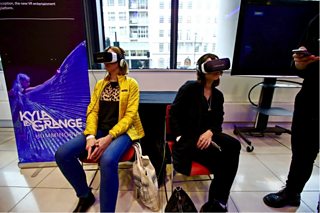
Attendees trying out a virtual reality music experience created by the team at Visualise
With the increasing capabilities of virtual reality headsets, the last couple of years have seen the emergence of production companies focussing on virtual reality and immersive experiences. is a UK based company that has produced a variety of 360 degree videos and virtual reality content across a range of genres ranging from sport to entertainment.
The new medium of virtual reality holds great potential for the music industry. Technologies like this will bring fans closer to the artist and allow them to experience music in a unique and incredibly immersive way – imagine sitting in your living room and being able to feel as if you had been teleported to the front row of a stadium concert in another part of the world or feel as if your favourite artist was singing just for you.
3D music controllers
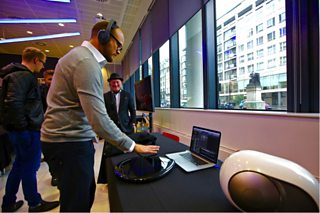
The Titan Reality ‘3D sensing’ device in action
has created a ‘3D sensing’ device that uses artificial intelligence and gives individuals a whole new way to manipulate sound and lighting. We were lucky enough to have one of only a handful of Titan Reality devices in the world at the event. By simply floating and moving your hand above the device, it is possible to change the tone and pitch of sounds, switch instruments and add in effects. It was exciting to see the device in action and how it offers a user with little musical instrument training the ability to create unique soundscapes. As well as the music industry, the company is also looking at how the device can be used in other areas such as controlling industrial robots by using machine vision technology.
Broadcast your own radio station from your phone
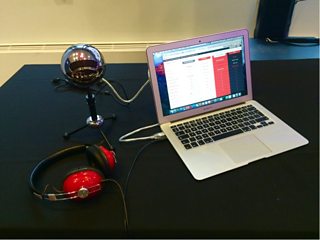
A simple Mixlr set up
Artists, DJs and bands are increasingly using new technologies and online platforms to reach audiences around the world and is looking to capitalise on that trend. Founded in 2010, the company has built an app that allows users to live stream their performances to fans around the world (for example via a band’s own website) and at the same time share that broadcast on social media outlets and on-demand music platforms. As you can see from the image above, the set-up is simple, making what has traditionally been a complex operational challenge accessible to a much wider audience.
The start-ups and technologies that demoed at our Future of Music 2016 event give us a glimpse into how digital technology will change the future of the music and radio industry.
Not that long ago, a portable cassette player seemed to be the cutting edge of technology – now they are considered retro collectible antiques. Today, smartphones are the driving forces of change in the music industry. And who knows, in years to come we might look back nostalgically on the smartphone era as we walk around with into our brains and have our music beamed directly to us!
We are always looking out for ways to bring third party innovation into the �������� to help us explore how we can use new technologies to create new types of content and experiences for our audiences. If you have any innovation ideas or technologies that you think our audiences could potentially benefit from, do get in touch in the comments section below or contact me on Twitter .
